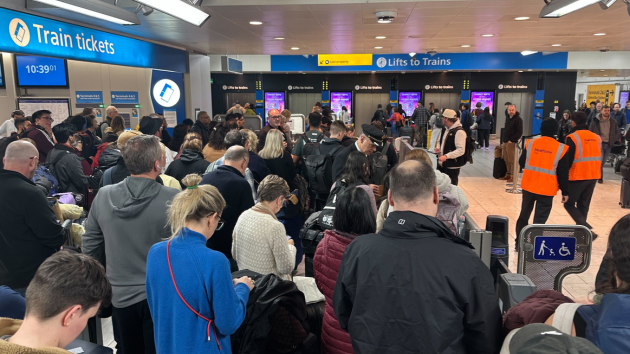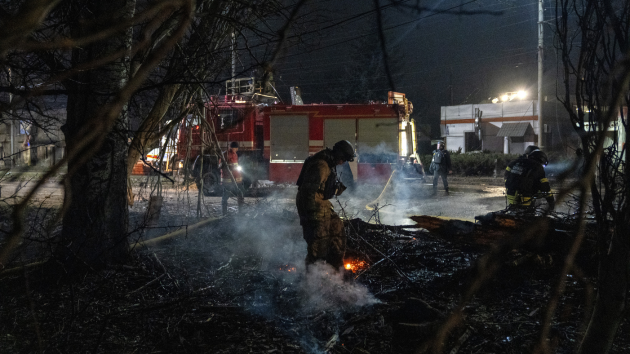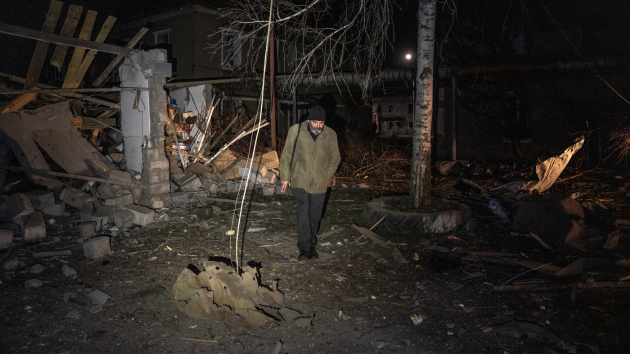Out of Gaza, into uncertainty: critically injured Palestinian family escapes with help of ‘angel’ IDF medic
Written by ABC Audio ALL RIGHTS RESERVED on August 1, 2024
(NEW YORK) — The plight of Palestinians trapped in war-torn Gaza has captivated the world since the Oct. 7 Hamas-led attack on Israel, but people who fled the region for medical treatment face a different kind of challenge.
At the Al Sawana hostel in Israel-occupied East Jerusalem, Gazan cancer patients in remission are trapped in a state of limbo. Their medical permits limit their movements to the confines of their hotel or hospital.
In March, a new layer of stress was added when the Israeli government ordered a group of 22 Palestinians who’ve completed treatment for life-threatening illnesses to be sent back to Gaza.
Reem Abu Obaida is one such patient, having left Gaza shortly before the war began to get chemotherapy for Stage 2 breast cancer. Since then, she hasn’t seen the children she left in Khan Younis, a city in southern Gaza that’s been devastated by Israeli bombardment.
“There is no safe area to go back to in Gaza. Our houses are gone, my kids are living in tents. I’m very afraid,” she told ABC News, speaking in Arabic. “I’m a sick person and my immunity is weak, I can’t live in those places.”
Under intense pressure, Israel approved a mediation process for patients that deals with each family on a case-by-case basis. It means there’s less chance of patients being sent directly back to Gaza, but their circumstances remain unclear. This process is overseen by COGAT (Coordinator of Government Activities in the Territories), the Israeli Defense Ministry agency that helps to coordinate activities between Israel and Gaza.
Obaida, who says she still requires follow-up hormonal treatment, is among hundreds of Palestinians who traveled to East Jerusalem for specialized care that’s unavailable in Gaza. In the wake of Oct. 7 and the Israeli response, few terminally ill or critically injured Gazans have been treated in the city.
However, Wesam Halabi’s family is among a handful of people who got out of Gaza after Oct. 7 and have been staying at an East Jerusalem hospital, St. John’s. They’re from Beit Lahia, a city in northern Gaza.
On Nov. 23, they were taking shelter in Halabi’s brother’s house after the destruction of their own home.
“Bullets and bombs hit the house, the bullets and bombs came in,” Halabi said, speaking in Arabic. “Around 100 soldiers came in. They held the guns to the heads of my young children and my husband. They told us to raise our hands, and they find us alive and not dead.”
Halabi had lost consciousness and awoke to find her face was bleeding heavily, with soldiers all around her and her family, she said. Their fate apparently changed when an Israel Defense Forces (IDF) medic arrived and demanded that the soldiers lower their weapons.
“At that moment, she took them out right before they were about to kill us,” Halabi said. “She saved us at the last moment.”
Medical reports detailed the extent of the injuries the family sustained in explosions that day: shrapnel pierced through Halabi’s eye, her husband had multiple puncture wounds and fractures in his spine, while their teenage daughter had abrasions from debris.
In a highly unusual move for the IDF, the medic loaded the family into an armored vehicle and took them out of Gaza for treatment at two East Jerusalem hospitals. While Halabi and her children went to St. John’s, her unconscious husband was taken to the nearby Makassed Hospital.
For a month after being spirited to separate hospitals, the family had no idea they were being treated in such close proximity.
“We thought he was killed. He was feeling the same. He was crying thinking we had died,” Halabi said of her husband. “After a month, a nurse came from the hospital where my husband is a patient. The nurse came with a patient. He brought up our story in front of him. He said we have a patient who says, ‘I don’t know about my family. Are they dead? Are they not? Did they bring them? We don’t know?’”
Despite realizing her husband was alive and a 6-minute drive away, they still couldn’t visit him due to the strict movement restrictions applied to Palestinians on medical permits.
Guy Shalev is the director of physicians for Human Rights Israel, the NGO fighting the government’s push to deport Gazan patients once their treatment is complete. He has been tracking the case of Halabi and her family.
“They are basically illegal if they leave the hospital and they risk being arrested,” Shalev said of their situation. “And this whole system is part of a larger kind of bureaucratic mechanism of the permit regime that really controls every movement of Palestinians.”
ABC News reached out to the Israeli government, the IDF and Defense Ministry unit COGAT about the efforts to deport Palestinian patients, but they said they do not comment about ongoing court cases.
In the Knesset, the Israeli house of representatives, Simcha Rothman of the right-wing Zionism Party serves as the chair of the constitution, law and justice committee. He explained why he’s been advocating for patient deportations, despite the risks that they’ll die due to Gaza’s lack of sanitation or a functional health system.
“It’s not that sending people to Gaza is a death sentence, but in war you must take care of your own people,” he said, before addressing the medic’s decision to help Halabi’s family. “To help them is a good thing. To bring them to East Jerusalem is a very bad idea because they will be the hotbed … for the next attack on Jews in Israel.”
Human Rights Israel’s Guy Shalev suggested that viewing vulnerable patients as potential terrorists leads to every Palestinian being labeled the same way.
In East Jerusalem, Halabi had a message for the medic who saved them.
“She was like an angel coming from the sky. I genuinely thank her for saving my children’s lives and for saving us,” she said. “She did such good for us. I support charitable work, I encourage everyone who is good. I love all those who do good things, and not violence, killing and war.”
During ABC News’ reporting on Halabi and her family, word came that they were being allowed to visit her husband after four months of separation. Despite the trauma of the recent past and unknowns ahead of them, the family found a moment of joy in their surprise reunion.
On July 30, at least 85 sick and severely injured Palestinians from Gaza, including 35 children, were evacuated to Abu Dhabi for specialized care, WHO Director General Tedros Adhanom Ghebreyesus said on X. It was the largest medical evacuation since October 2023, he noted.
Copyright © 2024, ABC Audio. All rights reserved.







